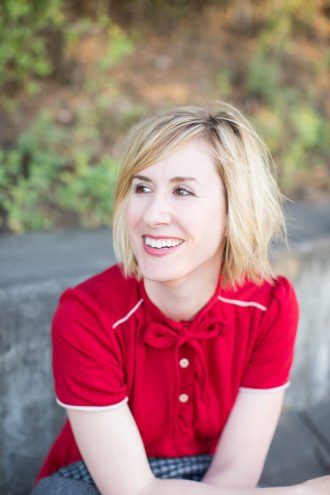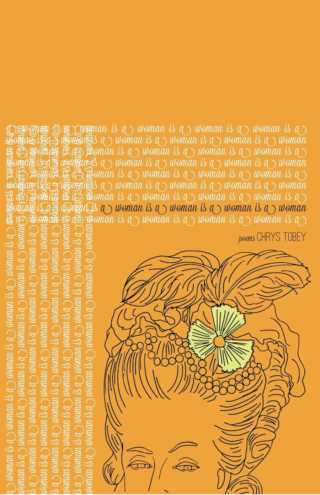Portland Poet Chrys Tobey


Chrys Tobey is a feminist poet who does not take herself too seriously. In her recent book, A Woman Is A Woman Is A Woman Is A Woman, she mentions the word penis twenty six times in the relatively short poem “One Morning”. She laughs when she tells me it’s her favorite poem to read out loud. Through this humor she connects with her audience before getting into some weightier subjects. In the poem “So Far I May Live a Long Life”, she lists her failures without shame or regret but as proof of a life truly experienced. In ten years of living and writing in Portland, her poetry has been published in numerous publications and has been nominated for a Pushcart Prize.
A self-proclaimed introvert, Chrys dreams of a life like Emily Dickinson’s, where her sister (also a local poet) would wheel her groceries up to her bedroom window. I met up with Chrys over coffee in a bustling bar where we talked about her new book, her introversion and the ever growing problem of technology taking over our lives. In person, Chrys is very much down to earth and warm, like an old friend that you’ve actually never met.
ELEVEN: You recently wrote the book A Woman is A Woman is A Woman is A Woman, and one of the Poems in it is “So Far, It Looks Like I May Live a Long Life” that deals with failure. Can you talk about this poem a bit? You say that you don’t believe in failure?
CT: I don’t believe in failure, and that was kind of the point of the poem. I was definitely approaching it with humor in a very tongue-in-cheek way. I was thinking of Beckett too, “Fail again, fail better.” So really what that means is try again, try better. So I was looking at my failures as trying. That’s all we can do is just keep trying. Failure is an American concept, right? Where we’re always in a rush to have a perfect life and get to the end product. I’m more interested in living and experiencing. I have never felt so vulnerable writing a poem before. When I first started writing it, I kept trying to justify all of my failures. So I’d list a failure, and then justify it. I’d write a reason for why I failed. When I went back and revised it, I thought, it’s the vulnerabilities that people are going to connect with, not my justifications. So I wanted people to connect with the vulnerability within the poem. I remember when The Cincinnati Review published it and I had a moment of nervousness and I thought, “Oh my God, It makes me feel so vulnerable.” I felt very exposed and raw. Then I realized, that’s part of why I write. That’s the largest reason, to connect with others. That’s how we connect, through our vulnerabilities. And many of us have had failures.
11: That is a very accessible poem. Can you talk about your poetry? I find that some poetry is so abstract that you have to convince yourself that you understand it, but you don’t. Can you talk on that a little bit?
CT: I can appreciate many different styles of poetry–poetry that’s more language driven or more abstract. But for me, I’ve come to this realization that I write out of loneliness. I have always been a lonely voyager. I write to connect with others. So I want my writing to be accessible. I think it was Coleridge who said “Poetry is for the common man.” That’s how I think about poetry for myself. Because I want people to be able to connect with me, and relate with it.
11: Not that people are hiding behind language, but poetry can be difficult. James Tate, for example, made poetry more palatable to the masses partly due to his sense of humor.
CT: I love James Tate, and he’s a big influence. I use humor a lot in my poetry too.

11: You mean like in One Morning, the penis poem?
CT: Yes [laughs], that’s my favorite poem to read out loud, by the way.
11: Can you keep a straight face?
CT: I’ve had some poems that I’ve been working on recently that I can’t because I’m trying to push the humor as far as I can. Even further than the penis poem, because I feel like with humor. But the reason I do it is because I feel like with humor, we turn towards it. And I’m interested in finding ways for people to turn towards my poetry. Instead of me saying, “Well we have a long history of men treating women like shit.” That’s going to turn the reader off. I want to find a creative and funny and creative way to make all readers turn towards it. I can’t look up when reading that poem, because there are so many penises.
11: What has the response been on that poem?
CT: People seem to like it, they laugh. So I like to read it early for a way for them to laugh, and be more receptive to my work. Because I have a lot of feminist poems, I am a feminist poet. If I read that poem earlier, they are much more receptive to what I am going to read after that poem.
11: Can we talk about the poem “To The Guy Who Unfriended Me on Facebook After I Got Married?” What inspired that title? Was it anger?
CT: I don’t think it was anger, it was this idea of technology. I was more humored by it. But this idea of how disconnected we’ve become through technology. My sister likes to say I’m a luddite. I just started texting for the first time in my life a year ago. I had a flip phone and had the phone company block text messages until they wouldn’t block them anymore. Then my flip phone died so I bought an Android. I don’t even know how it works yet. So it’s just this longing to connect, basically.
11: Can you talk about how disconnected we’ve become because of technology?
CT: I feel that just since I’ve been texting in the last year, what it’s done to me. Basically the reason I have been a luddite is because I find I have the monkey brain. Even though my friends can get very upset with me for not texting and doing all of these things on social media. It’s because I feel that I need that alone time and that solitude to create. I need that time to daydream. I need to spend five hours in the morning losing track of time and daydreaming. If not, I’m not going to create. So I try to limit my amount of distractions when it comes to technology. It’s hard. I have noticed that since I’ve started texting for the first time in my life a year ago, I can feel more anxious without my phone. I can feel more overwhelmed.
11: Do you think there will be poets and those sorts of people who will shun the overuse of technology and stay on the page?
CT: I hope so. I’m a little bit of a nihilist these days. It’s not looking good, but I hope so. I think we need that. I think it is definitely making us feel a lot of anxiety, more alone, more depressed, more disconnected. When I was a kid I was definitely lost in my imagination. Every report card said “Daydreams too much.” So it will continue, because there will be people like us.
11: What about having your stuff online, for exposure?
CT: Well that’s funny, when the Internet first started to become the beast that it’s become, online journals would ask me for my work and I’d always give them my crappiest work. Because I was saving it for the revered print journals and I didn’t realize that “Oh wait, this is going to stay online forever. Actually people are going to read my work this way instead of the print journals.” So it’s been an interesting revolution. Now I’m much more aware.



